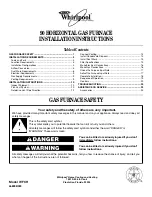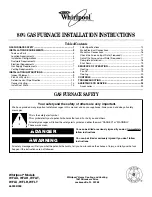
All local and national code requirements governing installation of
oil burning equipment, wiring, and flue connections must be
followed. Some of the codes (issued by the Canadian Standards
Association, the National Fire Protection Agency, and/or the
American National Standards Institute) that may be applicable are:
ANSI/NFPA 31: INSTALLATION OF OIL BURNING EQUIP-
MENT
ANSI/NFPA 211: CHIMNEYS, FIREPLACES, VENTS, AND
SOLID FUEL BURNING APPLIANCES
ANSI/NFPA 90B: WARM AIR HEATING AND AIR CONDI-
TIONING SYSTEMS
ANSI/NFPA 70: NATIONAL ELECTRICAL CODE
CSA B139: INSTALLATION CODE FOR OIL BURNING
EQUIPMENT
CAS C22.1: CANADIAN ELECTRICAL CODE
Only the latest issues of these codes should be used, and are
available from either The National Fire Protection Agency, Bat-
terymarch Park, Quincy, MA 02269 or The Canadian Standards
Association, 178 Rexdale Blvd., Rexdale, Ontario M9W 1R3.
Recognize safety information. This is the safety-alert symbol
When you see this symbol on the furnace and in instructions or
manuals, be alert to the potential for personal injury.
Understand the signal words DANGER, WARNING, and CAU-
TION. These words are used with the safety-alert symbol. DAN-
GER identifies the most serious hazards which will result in severe
personal injury or death. WARNING signifies a hazard which
could result in personal injury or death. CAUTION is used to
identify unsafe practices which may result in minor personal
injury or product and property damage. NOTE is used to highlight
suggestions which will result in enhanced installation, reliability,
or operation.
INTRODUCTION
The model 368RAN Furnaces are available in 2 sizes. Each size
unit can be fired at 3 different rates by a simple nozzle change.
Unit 036105 covers input ranges from 91,000 to 105,000 Btuh,
unit 060120 covers input ranges from 119,000 to 154,000 Btuh.
This furnace is a Low-Boy unit. It may be operated only in the
upflow configuration.
The furnace is shipped as a packaged unit, complete with burner
and controls. It requires a line voltage (115 vac) connection to
control box, a thermostat hook-up as shown on wiring diagram, oil
line connection(s), adequate duct work, and connection to a
properly sized vent.
The air handling capacity of this furnace is designed for cooling
airflow. Refer to Table 13 of 14 for expected airflows at various
external duct static pressures.
Fig. 2—Dimensional Drawing
DIMENSION (IN.)
UNIT
SIZE
UNIT DIMENSIONS
FLUE
HEIGHT
RETURN
OPENING
SUPPLY
OPENING
VENT
CONN
Width
Depth
Height
A
B
C
D
E
036105
21-1/4
53-3/4
31-1/2
26-1/2
20
20
5
060120
21-1/4
60-5/32
34-3/4
28-11/32
22
24
6
A98009
A
D
10"
E
3"
B
C
21
1
⁄
4
″
20"
20"
20"
VENT
CONN
—2—


































